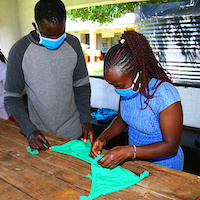Think you know water? Think again!
19 March 2013
This is, as you may already know, the Year of International Water Cooperation. Numerous charitable and developmental organisations are highlighting the role of water supply in development — and the more basic need for safe water. The international development organisation Progresio is just one of the groups in Ireland supporting the concept with its own event, the Water in the World Month. It has been, or will be, promoting water-themed events and activities highlighting consumption, land issues, small-scale farming and water cooperation, as well as the problem of plastic bottles and numerous other issues. Find out more at http://www.progressio.ie/water/water-in-the-world/ However, in a few days’ time, there’s a global perspective on its way as World Water Day takes place. The UN’s World Water Day is held annually on 22 March as a means of focusing attention on the importance of freshwater and advocating for the sustainable management of freshwater resources. An international day to celebrate freshwater was recommended as long ago as 1992 by the United Nations Conference on Environment and Development (UNCED). The United Nations General Assembly responded by designating 22 March 1993 as the first World Water Day. It’s shocking to think that if the world’s population is (at a very conservative estimate) around seven billion, then just over 14 per cent — or one seventh — of that population lacks access to safe water. Extend the statistic to basic sanitation and we’re talking about 2.4 billion human beings — or over a third of the world’s people. This is a continuing theme of Friends of Londiani’s work of course. We have always been concerned with efficient and safe collection and use of water in a region where many schools do not have adequate sanitation. Beyond Londiani, in Kenya as a whole, over a million very young children die every year due to lack of access to proper sanitation and safe water. Like so many of the areas we deal with (such as maternal health, basic business training and effective supply of sanitary products for women, to name only a few) the advantages of promoting an efficient water supply policy go well beyond their immediately evident worth, encouraging economic empowerment, education and sustainable communities among other benefits. So if you think you know water, maybe it’s time to think again! Or go to http://www.unwater.org/water-cooperation-2013/water-cooperation/faq/en/ and find out just how far-reaching the effects of good water cooperation can be — and how challenging achieving those effects really is.

